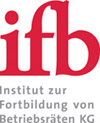 |
| Welcome to issue no. 4 / 2010 of EWC News. 27th December 2010
|
|
The training and consultancy network
"euro-workscouncil.net"
EWC
News appears four times a year.
You can find past issues in the newsletter archives.
|
| 1. Report on time-off for
employee representatives
|
|
Difficult situation for East European employee representatives
From a country standpoint we can see a clear east west divide. In the Baltic States and Bulgaria, time-off for employee representatives is particularly low and in other central and Eastern European countries there are a large number of elected representatives without any paid time-off at all. Only Romania, Croatia and Hungary provide favorable exceptions.
The best figures for time-off come from the Scandinavian countries, Germany and Austria. In the UK where time-off is around the European average but not at all well defined, employee representatives must be particularly flexible. However new time-off rules came into force in the UK beginning 2010, but could not yet be taken into consideration in the survey (see report in EWC News 3/2009).
Difficulties also in West European countries
In Western Europe, Ireland and Italy come bottom of the class. On the subject of time-off rights for company employee representatives they even come after the Czech Republic, Poland and Slovakia. In Ireland this may be due to the fact that works councils are still a relatively recent phenomenon, and were first introduced, on a legal basis, in 2006. In Italy also, employee bodies such as RSU, which are elected by the employees, do not have a very long history. Italian trade unions were less interested in the reinforcement of company employee representatives than the trade unions of other countries. Even today Italian EWC mandates are quite often occupied by full-time trade union officials instead of company representatives.
Works Council Advisers
There are also large differences between individual countries as to whether a works council may call in experts at the employers’ expense. The German Hans Boeckler Foundation published a survey on this subject in December 2007 (see report in EWC News 1/2008).
|
| 2.
Current situation of Danish employee representatives
|
|
For a long time Scandinavia was considered as the model throughout Europe for strong trade unions. But what is the real situation of company employee representatives in Denmark in the 21st century? This question was examined at the beginning of 2010 in five individual studies carried out by the University of Copenhagen on behalf of the LO Danish trade union confederation. The results were published on 11th October 2010.
The research shows that collective employee representation exists for only one in every two jobs. While 91% of all jobs in the public service are covered, this applies, in the private sector, to only one in every three jobs. Union representation is particularly weak in IT companies, and on the other hand relatively strong in production sectors. Also union membership has fallen. As in all Scandinavian countries the union membership rate was over 80% for a long time, however in Denmark it fell below 70% in 2008. These difficulties represent a big challenge for the Danish model, which is based rather on collective bargaining and less on legislation. Reactions to the financial market crisis
The study also shows that 90% of all company employee representatives were affected in Denmark by the repercussions of the financial market crisis. There were redundancies in half of the cases, with mostly collectively managed severance conditions. In two thirds of the cases the company employee representatives gave support to their dismissed colleagues. Wage freezes were also reported from one fifth of the Danish employee representatives.
According to surveys by the European Trade Union Institute (ETUI) in Brussels there are currently 31 multinational companies headquartered in Denmark with EWC. So altogether, 3.2% of all European works councils operate according to Danish legislation. A further 34 Danish companies could create a EWC, since they fall under the scope of the EWC Directive. Companies in Denmark with a European works council include the brewery chain Carlsberg, the Radisson Hotels, the heating and pump manufacturers, Danfoss and Grundfos, the toy manufacturer Lego, Danske Bank (see report in EWC News 1/2008), as well as the facilities management company, ISS (see report in EWC News 2/2008). The most recent EWC establishment took place only in June 2010 for the retail chain Jysk Nordic (see report in EWC News 2/2010). |
| 3. Notes
from other countries
|
|
Germany: Federal Government brings EWC legislation to the Bundestag
In October 2010 the French Ministry of Labour consulted French social partners and some HR directors in preparation for draft legislation. The main focus was on financial aspects and will contribute to an impact assessment of the new EWC legislation. For example companies should list what costs are involved for the activities of a Special Negotiation Body (SNB). They were also asked whether an operational report of their EWC exists. There were no questions on the difficulties arising for employee representatives.
A total of 60 questionnaires were returned to the Ministry. The official bill is expected in early 2011. A similar assessment was carried out by the British government (see report in EWC News 1/2010). The new French EWC law will be presented in detail to a German-French Symposium from 29th June to 1st July 2011 in Paris.
Swing to the left for the largest British trade union
|
| 4. European
Works Council – action days
|
|
Demonstrations force European-wide negotiations
Following the day of demonstration, the group’s management agreed to negotiate a European-wide framework agreement on restructuring with the European Metalworkers’ Federation (EMF). As is the case in other companies (see report in EWC News 3/2010), Alstom will therefore go beyond the information and consultation rights of the European works council. The EWC is currently evaluating two financial studies of the restructuring plan. Central management is therefore unable to take any unilateral measures before February 2011. The following texts are available only in German:
On 27th October 2010, employees from the drinks bottling company Coca Cola Enterprises (CCE) in France, Belgium, the Netherlands and the UK demonstrated against planned cuts in the workforce. Demands were made for a correct consultation procedure and for negotiations on an agreement covering alternative employment opportunities and job security. In the United Kingdom alone, CCE has six bottling stations with 4,500 employees. CCE was spun-off in 1986 from its parent company, The Coca Cola Company, as an independent firm and has a EWC established since 1998 under Belgian law. CCE came under criticism already in 2006 due to the unsatisfactory involvement of the EWC. |
|
5.
New EWC
agreements |
| European-wide code of practice for temporary employment
In the future temporary employees in all countries of the European internal market are to be employed no longer than six months and are to be put on an equal footing with permanent employees for wages, working time and vacation. This applies explicitly also to maternity protection and anti-discrimination. Temporary employees will also have the same means of accessing all the internal recruitment postings as permanent employees.
Monitoring by the European works council
A copy of the new code of practice is to be distributed to all the temporary employees throughout Europe. Local representatives are responsible for controlling its’ application. The European works council is informed if the code of practice is violated. Central management is to present an annual report on temporary employment at the plenary meeting of the EWC.
Through the acquisition of parts of the Fortis Belgian banking group (see report in EWC News 4/2008) the French financial institute, BNP Paribas, has now taken on a genuine European dimension. On 21st June 2010 a revised EWC agreement was finally signed after months of negotiations.
The EWC, established in 1996 under French law will consequently be extended from 32 to 49 members with 13 from France and five each from Italy and Belgium. It meets twice annually with, in the future, representatives from 20 countries including 3 new from the Scandinavian countries. The ten member steering committee meets four times annually and receives a budget of 15,000 € for external advice. Whereas many new EWC agreements are already based on the standards of the new EWC Directive, the largest French commercial bank restricts itself to information only. In the entire agreement there is no word of consultation rights.
Revised EWC agreement for catering and retail chain
Special webpage for download of further EWC agreements.
|
| 6.
Highlights from the EWC agenda |
|
On 8th September 2010 the board of directors of Electricité de France (EdF) decided to sell the British electricity network to the conglomerate Cheung Kong. EdF bought the formerly nationalized British energy group as recently as 2008 and will now split the largest British energy producer into pieces. The network is to be sold, whereas the French energy group will keep the British power stations. The French state has an 85% majority ownership in EdF. The decision for the sale was announced only after the completion of the consultation procedure with the European works council, which was convened on 3rd September 2010 to an extraordinary meeting in Paris.
The 5,300 British employees involved in the sale fear that the new owner from Hong Kong could compromise their information and consultation rights. In addition the agreement signed in 2005 on minimum social standards for EdF will no longer apply in the future. Discussions between the British trade unions and the new owner have been underway since 5th August 2010.
EWC criticize CEO compensation
Following its plenary session on 20th October 2010, the European works council of the electronics company, Alcatel-Lucent, denounced publicly the inconsistent HR policy. The European Committee for Information and Dialogue (ECID), the official name given to the EWC, has been continually confronted with restructuring programs following the merger of the two former companies in 2006. During 2009 alone, one eighth of the workforce was made redundant in Europe provoking massive protest demonstrations (see report in EWC News 4/2009). Management’s poor information policies provoked an exceptional court decision in Paris in April 2007, when for the first time judges ruled on exact criteria for business reporting to European works councils (see report in EWC News 2/2007).
Electoral observers sent to Spain
Philips also under fire
Similar problems are also reported for the Dutch electronics company, Philips. In this case five of the 23 EWC members are not elected but appointed by management. In Hungary and Sweden employee representatives from Philips have been dismissed. |
| 7. Information
media for European employee representatives
|
|
The Directorate-General for Employment, Social Affairs and Equal Opportunities of the European Commission in Brussels releases an English language newsletter every two weeks in which it informs about its work, legislative initiatives and events.
New statistics on European Works Councils
The European Trade Union Institute (ETUI) in Brussels produces a monthly English language newsletter about current trends in collective bargaining in the individual European countries. The newsletter is edited in co-operation with the University of Amsterdam and is also available on-line.
The VÖGB training center has produced various video clips as part of their union training program. They explain in German language the establishment and operation of European works councils, social dialogue as well as the legislative process in the European Union. |
|
8. No stop to participation dodging through the SE
|
|
Impreglon from Lüneburg (Germany) has been operating as an SE since 27th October 2010. Through its transformation into a European Company, the supplier of coating systems was able to replace the previous board of directors and supervisory board by a three member administrative board. The participation of employee representatives has been ruled out through the SE transformation. In Germany there are 340 employees in seven sites, a works council exists only at the Landsberg site. There are also subsidiaries in France, Italy, Hungary, Poland, Sweden, Switzerland, as well as in the United Kingdom and the Netherlands. The Impreglon example resembles that of Mensch und Machine Software AG, which was converted in 2006 into a SE (see report in EWC News 2/2007).
Berner Holding from Künzelsau (Germany) was also able to keep employee representatives away from the supervisory board through its SE transformation. With around 1,400 employees, the German workforce of this family run business lies just under the threshold of 25% of the European workforce. They therefore lose the protection of German participation rights. The Berner group does business in assembly technology and chemicals and has grown substantially in the last years through acquisitions. It operates at present in 20 countries of the European internal market with almost 6,000 employees. The transformation into "one of the most modern legal forms", according to a company press-release, took place in November 2010. "Modern" apparently means a form that avoids employee participation rights.
European Commission little concerned with Participation dodging
The passages on the election of Special Negotiation Bodies and on the time-line for negotiations for employee representation in the SE are of particular interest for employee representatives. The process is described as being far too complex and time-consuming, particularly in companies with few foreign employees. Not a single criticism can be found in the document of the opportunity which the SE Directive provides to avoid employee participation. |
|
9. The view
beyond Europe |
| Spanish Oil Company fosters world-wide social dialogue
Banks disregard employee rights in the Caribbean
World-wide framework agreement for French energy group
Wood processor accepts world-wide social standards
|
| 10.
Interesting web sites |
| World-wide barometer for working life
The European Commission launched, in March 2005, a consultation of social partners on company restructuring, a key aspect of European works councils’ activity. As part of the ARENAS project, “Good practice” seminars were organized in all 27 European Union countries with a view to broadening knowledge on the subject. The results have been presented in a final report available since October 2010 as well as documented on their own web site.
Privatization Watchdog
The latest news on labour and social policies as well as on Finish trade unions are available on an English language website. We have arranged various further interesting web-pages into a collection of links.
|
| 11. New
publications |

This book published in June 2010 examines several aspects of European labour and social policies. The authors summarize the lectures that they gave during a conference on “Employee Interests and Participation in a European Social Model" as part of the doctoral program of Hans Boeckler Foundation. Besides contributions on the monetary union and social security systems in the EU, of particular interest are those on the social dialogue at industry branch level and on participation within the European Company (SE). The analysis of current labour relations in the Baltic countries, in Romania and in Poland is particularly recommendable for EWC members. The book is available only in German.
There exist more than 3,000 free trade zones in 130 countries throughout the world. Governments use them to attract foreign investment capital and to establish transnational companies which usually produce for export. They are convinced that it has an effect on employment and promotes growth in the domestic economy as well as giving access to new technologies. The analysis published in July 2010 by the DGB trade union educational department throws a critical eye on free trade zones. The paper unmasks this global "beauty contest” in front of investors and uncovers the social, economic and development policy effects. The paper is available only in German.
Communication Manual for Employee representatives
On 13th December 2010 the European Trade Union Institute (ETUI) in Brussels released the first of a series of country reports on trade unions in central and Eastern Europe. The book describes the history and present day trade union landscape in the Czech Republic. If at the beginning of the 90’s, 80% of employees were still union members, the figure has at present fallen to a little more than 10%. Similarly to France, Czech trade unions are nevertheless in a position to mobilize nearly one million people on the streets such as during the general strike in June 2008. Concerning company employee representation the country has developed its own "Czech model" (see report in EWC News 1/2007). We have collected further literature on a literature webpage.
|
| 12. Training and Consultancy
Network "euro-workscouncil.net":
Examples of our work |
|
Third European conference of gravure printing
On 20th December 2010, the Rediter project partners met in Brussels with representatives from the European trade union federation UNI to evaluate the series of joint seminars. Workshops on the new EWC Directive were held over the last months in five countries such as in May 2010 in Madrid (see report in EWC News 2/2010), in October 2010 in Sibiu (Romania) and also in October 2010 in Berlin (see report in EWC News 3/2010). The training and consultancy network “euro-workscouncil.net” was the German partner in this project which is sponsored by the EU. Early 2011 a report will be established and published.
Magazine reports on works council conference in Paris
The German-French conference organized for the first time by the training and consultancy network “euro-workscouncil.net” in July 2010 in Paris found an echo in the German technical press. The magazine "der betriebsrat” (“The Works Council") gave an extensive report on it in its November 2010 edition.
|
|
13.
Current Seminar Schedule
|
|
Since January 2009 the training and consultancy network "euro-workscouncil.net" organizes conferences and seminars for members of European works councils, SE works councils and Special Negotiation bodies. So far 191 employee representatives from 97 companies have taken part (representing approximately 10% of all companies in Europe, with an established EWC). The majority of participants came from Germany and France, but also nine other countries were represented. A leaflet have been produced for the year 2011 giving an overview of the planned events:
Hamburg Conference for European Works Councils
24.01.2011 in Hamburg Employee representation in the United Kingdom after change in governement 25.01.2011 in Hamburg (both dates may be booked separately)
On
5th June 2011 the new EWC legislation came into force. It is the
appropriate time to offer the possibility for a detailed examination of
the legal text in its final version. To this end a EWC legal seminar
will take place on the 6th and 7th June 2011 at Montabaur castle.
French-German Conference in Paris
Why a conference in Paris?
The philosophy behind information and consultation in the EU Directive on European works councils as well as in employee participation in the European Company (SE) is closely tailored around French industrial relations. An exact knowledge of the subtleties of the French model is indispensable for growing a European works council from a song and dance act into a fully fledged representative body. The conference will have simultaneous interpretation. The program will be available shortly for download. The following texts are available only in German:
Following the coming into force of the new EWC legislation it is advisable in many companies to renegotiate the EWC agreement. To this end we are offering a workshop to enable an exchange of experience and to make a critical analysis of participant’s EWC agreements. The workshop will be held from 10th to 12th October 2011 in Eisenach on the Wartburg castle (photo). English interpreters will be available on request.
Seminars of the Institute for Further Education of Works Councils (ifb)
Basic seminar: The European Works Council from A to Z 11. – 15.04.2011 in Berlin 07. – 11.11.2011 in Munich
Advanced seminar and idea exchange 02. – 06.05.2011 in Cologne 21. – 25.11.2011 in Stuttgart
In 2011 the training and consultancy network "euro-workscouncil.net" will be organising another SE workshop. Since the number of SE works councils is still relatively small, the next date will be coordinated with any interested participants by telephone. Anybody interested should please fill in and return the following questionnaire.
In-house events Please find a survey of possible subjects of in-house events here: |
| 14. Imprint
|
EWC
News is published by: Training
and consultancy network "euro-betriebsrat.de" GbR Von-der-Tann-Straße
4, D-20259 Hamburg www.euro-workscouncil.net (English) www.euro-ce.org
(French) Authors
collaborating on this issue: Werner Altmeyer,
Sandro Maier, Rudolf Reitter
Distributor
of the German
version: 14,491 readers Distributor of the English version: 1,978 readers Distributor of the French version: 2,001 readers Newsletter
archive: www.ewc-news.com
We
are always pleased to
receive comments and suggestions in relation to this newsletter as well
as reports on your EWC activities. Please write us at: info@euro-workscouncil.net
www.euro-betriebsrat.de (German)


 Empirical
studies on Danish employee representatives
Empirical
studies on Danish employee representatives On
15th December 2010 the cabinet of the Federal Government in Berlin
concluded the draft revision of the EWC legislation. This transposes
the new EU Directive on European Work Councils in force since 5th June
2009. The German Bundestag now has until 5th June 2011, in order to
pass the law. The contents of the bill are to be covered during the
Conference for European Work Councils taking place on 24th January 2011
in Hamburg.
On
15th December 2010 the cabinet of the Federal Government in Berlin
concluded the draft revision of the EWC legislation. This transposes
the new EU Directive on European Work Councils in force since 5th June
2009. The German Bundestag now has until 5th June 2011, in order to
pass the law. The contents of the bill are to be covered during the
Conference for European Work Councils taking place on 24th January 2011
in Hamburg.  France: Non-public hearing on EWC costs
France: Non-public hearing on EWC costs
 On
21st November 2010 the election results were announced: Len McCluskey
now stands at the head of Unite, the largest single British union with
its’ 1.6 million members present in almost all industries of
the private sector. "The Red Len" was able to beat three of his rivals
with more than 100,000 votes in a general election. The former docker
from Liverpool sees his first task in leading a campaign against the
welfare cuts of the coalition government. Unite was created in May 2007
following a merger of two cross-industry unions (see
On
21st November 2010 the election results were announced: Len McCluskey
now stands at the head of Unite, the largest single British union with
its’ 1.6 million members present in almost all industries of
the private sector. "The Red Len" was able to beat three of his rivals
with more than 100,000 votes in a general election. The former docker
from Liverpool sees his first task in leading a campaign against the
welfare cuts of the coalition government. Unite was created in May 2007
following a merger of two cross-industry unions (see 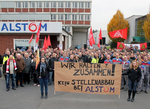



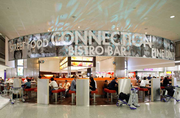


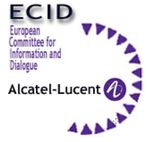 "Diet"
for Employees - despite better business results
"Diet"
for Employees - despite better business results 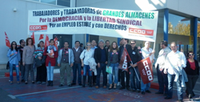





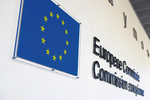


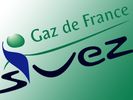
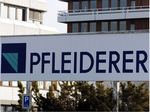



 News from Finland
News from Finland
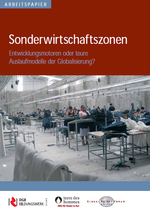


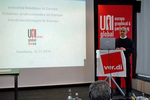
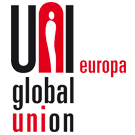 Evaluation of the Rediter
project
Evaluation of the Rediter
project




